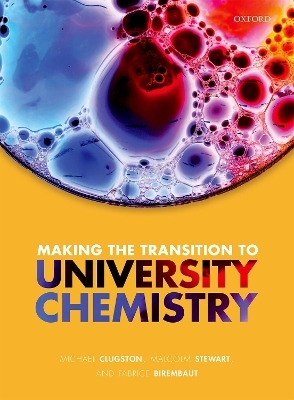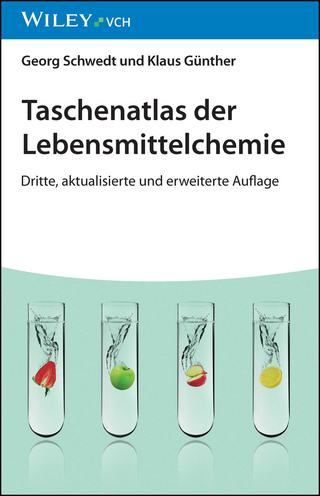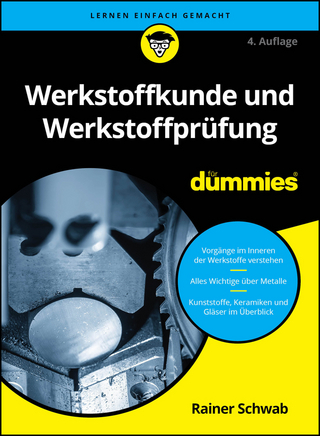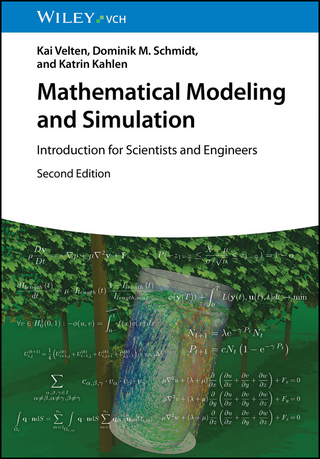
Making the transition to university chemistry
Oxford University Press (Verlag)
978-0-19-875715-3 (ISBN)
Making the transition to university chemistry is the perfect companion as students take the significant step from school to university, setting them up to be confident and successful in their chemistry studies.
Each topic opens with expanded bullet points that remind the reader of familiar ideas from their pre-university studies that they will be expected to understand at the start of their undergraduate course.
Taking the next step sections expand on these familiar ideas by way of more detailed explanations, which allow the reader to make links to work that will be important at university.
Finally, A Deeper Look sections explore more challenging concepts (either because the mathematical level is higher or the explanation is more complicated). Some of the concepts presented in these sections are among the most exciting in the subject: they give a flavour of the new insights the study of chemistry at university can offer.
Its focus on those topics that may not have previously been studied by all students, and those topics that are regularly misunderstood by incoming undergraduates, provides guidance tailored to the particular needs of this student cohort, laying the foundation they need to succeed throughout their university studies.
Digital formats and resources
Making the transition to university chemistry is available for students and institutions to purchase in a variety of formats.
The e-book offers a mobile experience and convenient access along with functionality tools, navigation features, and links that offer extra learning support: www.oxfordtextbooks.co.uk/ebooks
Michael Clugston studied at Wadham College, Oxford, where he was the Major Scholar in Chemistry in 1969. He won a Gibbs Prize in 1972 and a Thesis Prize in 1973. He stayed on for two years to research for a D.Phil. in theoretical chemistry with Peter Atkins, holding a Wadham Senior Scholarship. After a year as a Harvard Postdoctoral Fellow, working with Roy Gordon, he returned to the UK to hold an SRC Fellowship at Cambridge, as well as a Research Fellowship at St Edmund's College, Cambridge. In 1978 he became a full-time schoolmaster at Tonbridge School, where he remained for 40 years until his retirement. From 2009 to 2019 he was seconded to the University of Oxford Chemistry Department for a week each year to teach the Bridging Course. Michael has written for the A-level market: Principles of Physical Chemistry, Chemistry: Principles and Applications (both with Peter Atkins), and Advanced Chemistry (2000, OUP). Malcolm Stewart obtained a degree in medicinal chemistry and a PhD in carbohydrate chemistry from the University of Dundee. He then spent time at St Andrews (UK), Little Rock (USA) and back to Newcastle (UK) as a postdoctoral researcher before arriving in Oxford where he has been employed since 2001. Originally the Teaching Coordinator for organic chemistry, he became the director of the chemistry teaching labs in early 2018. Aside from his current post involving the management of the whole practical chemistry course at Oxford, he spends much time outside of term heavily involved in the department's outreach programme. Malcolm is also a college lecturer for St Hugh's College, Oxford, a fellow of the higher education academy (2008), was awarded a Postgraduate Teaching Diploma from Oxford in 2004, and was one of the recipients of the inaugural Oxford Vice-Chancellor of Education awards (2020) in recognition for his team's innovative work in developing methods for teaching practical chemistry. Fabrice Birembaut completed his undergraduate studies at the Université de Lille 1 before moving to Southampton for his PhD in vibrational spectroscopy. He was then involved in multidisciplinary research on the interaction between biological agents. From 2003 to 2005 he was a part-time lecturer at the University of Reading and received the best new lecturer award. In 2008 he became a Teaching Fellow in physical chemistry and outreach officer at the University of Birmingham and completed the first part of the Postgraduate Certificate in Teaching and Learning in Higher Education. From 2011 he ran the physical chemistry teaching lab at Oxford and was heavily involved in the department's outreach programme, also lecturing at Jesus College, Oxford. He then moved to the University of Maastricht in 2016, as head of the physical chemistry curriculum. Fabrice moved back to France in 2019 where he is director of projects and international development for a private Higher Education school in Normandy.
1: Atomic structure
2: Bonding and molecular shape
3: Moles
4: States of matter
5: Thermochemistry
6: Chemical equilibrium
7: Acid-base equilibrium
8: Redox reactions
9: Spontaneous change, entropy, and Gibbs energy
10: Kinetics
11: Trends across the periodic table
12: Group 2
13: The halogens
14: Transition metals 1
15: Transition metals 2
16: Introduction to organic chemistry
17: Hydrocarbons: alkanes
18: Hydrocarbons: alkenes
19: Hydrocarbons: arenes
20: Halogenoalkanes
21: Alcohols
22: Aldehydes and ketones
23: Carboxylic acids and their derivatives
24: Amines and amino acids
25: Polymers
26: Instrumental analysis
| Erscheinungsdatum | 01.09.2021 |
|---|---|
| Verlagsort | Oxford |
| Sprache | englisch |
| Maße | 197 x 265 mm |
| Gewicht | 576 g |
| Themenwelt | Naturwissenschaften ► Chemie |
| ISBN-10 | 0-19-875715-8 / 0198757158 |
| ISBN-13 | 978-0-19-875715-3 / 9780198757153 |
| Zustand | Neuware |
| Haben Sie eine Frage zum Produkt? |
aus dem Bereich


